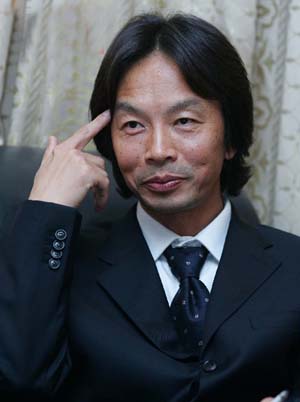Novelist Liu Zhenyun grew up in a small mountain village in central China's
Henan Province. He has a clear memory of the hardships the village folks lived. When he was a child, Liu dreamed of becoming a chef, a local opera actor, or a countryside teacher.
"All of the three vocations have close relation with the land where I was brought up. More importantly, I would not have to travel a field to see my beloved grandma. But going to a university has changed my life course irreversibly," recalls Liu, who has engaged in novel writing for 25 years.
The beginning of his writing career, however, was very much a drama.
Born in 1958 in Yanjin County, Henan Province, Liu became an army-man at the age of 15 and it was encouraged by one of his comrades that Liu started to learn how to write essays and short stories.
Demobilized from the army in 1978, Liu taught for a brief time as a middle school teacher. The same year, he was enrolled by Peking University in the capital.
Although Liu published his maiden works in campus journals at Peking University in the mid-1980s, he insists that his literary career started only after he began working as a journalist. Liu divides his writing career in three phases.
"At first, I write on the basis of my personal experiences and my inner feelings," he says. Such kind of works including Tapu Township (Tapu) and Chicken Feathers Everywhere (Yidi Jimao), reflecting his life experiences at different stages.
Liu's first well-known novel is Tapu Township published in 1982.
Responding to the Chinese society's collective memories of the dark and chaotic years, especially the "cultural revolution" (1966-76), Liu writes about the hardships and yearnings of Chinese youths at a time when China was at the early stage of a new era, the era of opening up and reforms.
Liu began attracting huge public attention after his two novels Chicken Feathers Everywhere and Working Unit (Danwei) were combined and adapted into a popular TV drama series by Feng Xiaogang in 1994.
The expression Chicken Feather Everywhere, or yidi jimao in Chinese, became a popular mainstream idiom and expressed the messy, boredom, resignation and trivia in the life of many Chinese, mostly at lower end of the social ladder. The story revolves around Xiao Lin, a civil servant, who finally comes to terms with his mundane life.
Liu admires such ancient literary classics as Zhuang Zi. In addition, he boldly expresses his disgust of some popular kungfu (wuxia) novels.
"Works short of imagination would exert negative impact on the readers. I believe people without imagination would always be weak and hopeless," he says.
Liu focuses on depicting average people in imaginative novels. "Small potatoes are the vast majority. Their daily living seems trivial and insignificant. The reality is their state of living determines the outlook of our time," he says.
"For instance, what happens in the tofu at the kitchen in Xiao Lin's (Chicken Feathers Everywhere) home means much more to him, to me and to society than the G-7 Economic Summit in the West."
(China Daily November 26, 2007)


